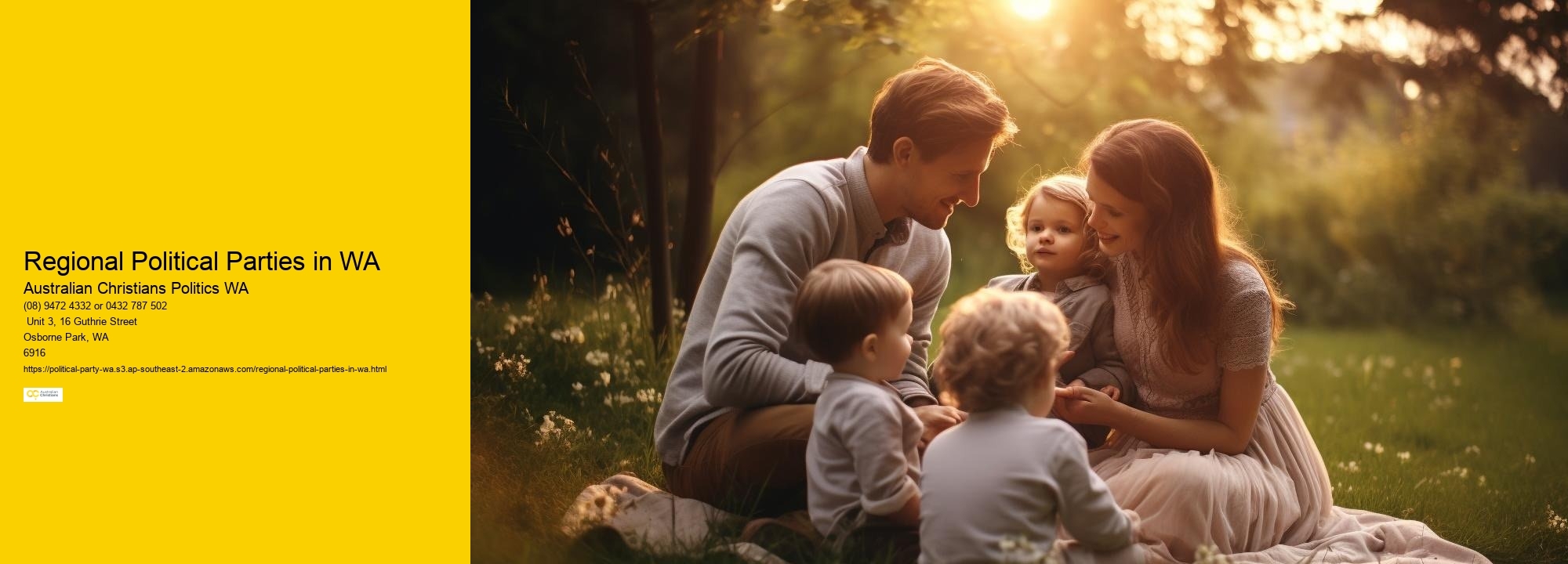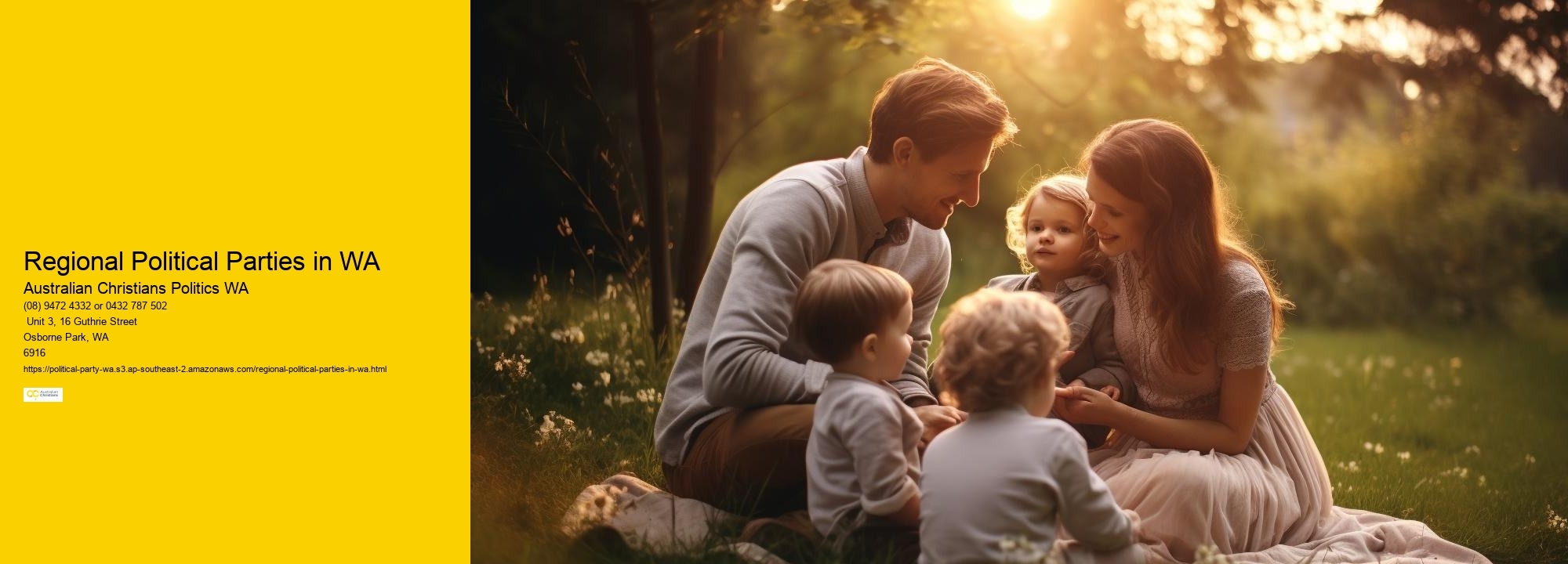

The Role of Political Advocacy in Western Australia Political advocacy plays a vital role in Western Australia's democracy, providing a voice for different groups and interests in the political process. Advocacy groups, NGOs, and civil society organizations actively work to influence public opinion and policy decisions. They raise awareness about various issues, from environmental protection to social equity, and hold the government accountable. Effective advocacy contributes to a more dynamic and responsive political environment in WA.
WA's Political Party Influence on Policies The influence of WA's political parties on policies is evident in the legislative and administrative decisions of the state. These parties, through their elected representatives, play a crucial role in shaping laws and regulations that govern various aspects of life in WA. Their policy priorities and ideological leanings significantly impact the direction of the state's governance and development.
Western Australia's Political Analysis of Global Affairs Western Australia's position in global affairs is shaped by its political analysis and responses to international trends and events. The state’s economy, heavily reliant on international trade, particularly in the mining and agricultural sectors, necessitates a keen understanding of global economic and political dynamics. WA's political leaders and analysts closely monitor global developments, ensuring that the state's international engagements and policies reflect both regional and global contexts.
Western Australia's Diplomatic Relations and Strategies Western Australia's diplomatic relations and strategies, particularly in the context of its economic interests and regional security, are vital components of its political landscape. The state’s interactions with international partners, especially in trade and investment, reflect its strategic approach to leveraging its resources and geographic position. WA’s diplomatic efforts also align with national foreign policy objectives, contributing to Australia's overall international relations.
Political Party Member Profiles in Western Australia Political party member profiles in Western Australia are diverse, reflecting the wide range of backgrounds and viewpoints within the state. Members range from long-time political activists to newer, younger members with fresh perspectives. Understanding these profiles helps in comprehending the internal dynamics of parties and the factors that motivate and engage their membership base. This diversity within parties is a strength, allowing for a rich exchange of ideas and experiences.
Western Australia's Approach to Federal-State Relations Western Australia's approach to federal-state relations is marked by a blend of cooperation and advocacy for state-specific interests. Given its unique economic and geographic characteristics, WA often seeks to ensure that federal policies and initiatives adequately reflect its needs, especially in areas like resource management and infrastructure funding. Balancing these state-specific priorities with national interests is a key aspect of WA’s political strategy, involving negotiation and collaboration with the federal government.
Western Australia's International Trade Policies International trade policies in Western Australia are critical to the state's economy, given its reliance on exports, particularly in the mining and agricultural sectors. The state's political strategies in this area focus on expanding market access, fostering trade relationships, and ensuring that trade agreements benefit WA's economy. These policies are key to maintaining the state's competitiveness in the global market.
WA's Political Strategies for Community Welfare Community welfare in Western Australia is a significant political focus, encompassing policies on social services, housing, and poverty alleviation. Political strategies in this area aim to support vulnerable populations and promote social equality. These strategies involve a combination of government initiatives, partnerships with non-profit organisations, and community-based programs. Ensuring the welfare of its communities is a central goal of WA’s political leadership.
Public Policy Making and Implementation in WA Public policy making and implementation in Western Australia involve a multifaceted process that includes stakeholder consultation, legislative development, and administrative execution. This process is designed to address the diverse needs of WA’s population and ensure effective management of the state's resources. Policy outcomes in WA are closely monitored to assess their impact and efficacy, allowing for ongoing refinement and adjustment.
Western Australia's Cultural Policy and Politics Cultural policy in Western Australia encompasses support for the arts, heritage preservation, and cultural diversity. The politics surrounding cultural policy involve funding decisions, support for cultural institutions, and initiatives that celebrate WA's multicultural identity. These policies reflect the state's recognition of the value of culture in society and its role in fostering community and identity.
Political Campaign Finance in Western Australia Campaign finance in Western Australia is a critical aspect of its political system, governed by regulations to ensure transparency and fairness. These rules are designed to prevent undue influence and maintain public trust in the electoral process. The financing of political campaigns involves a mix of public funding and private donations, with ongoing debates about how to best balance these sources to support robust political competition while avoiding corruption and ensuring equal opportunity among candidates and parties.
Western Australia's Political Party Coalitions Political party coalitions in Western Australia are sometimes formed when no single party gains a majority. These coalitions require negotiation and compromise, with parties aligning on key policies and governance strategies. Coalition governments can lead to more collaborative and representative decision-making, although they also present challenges in maintaining unity and coherence.
Political Party Volunteer Opportunities in WA Volunteer opportunities within WA’s political parties play a vital role in engaging and mobilizing supporters. These opportunities range from campaigning and community outreach to policy research and administrative tasks. Volunteering not only contributes to the party's operations but also provides individuals with a deeper understanding of the political process and an avenue to influence change.
WA Political Party Leaders The leaders of WA's political parties are figures of significant influence and public interest. They are not only the face of their respective parties but also play a crucial role in shaping party policies and directing political strategies. These leaders are often experienced politicians with a deep understanding of both the state's needs and the broader national and international political contexts. Their leadership styles and decisions can greatly impact the fortunes of their parties and the political direction of Western Australia.
Political Party Membership WA Membership in a political party in Western Australia (WA) is not just a statement of political alignment, but an active engagement in the state's democratic processes. Members of these parties contribute to shaping policies, selecting candidates, and driving political campaigns. They are the backbone of the party, often volunteering during elections and participating in party meetings to discuss and influence the party's direction. Membership dynamics in WA reflect the evolving political landscape, with increasing participation indicating a healthy and vibrant democracy.
Technological Innovations in WA Political Parties Technological innovations have transformed how WA's political parties engage with the electorate, conduct campaigns, and manage operations. From digital campaigning to data analytics, technology is increasingly integral to political strategy and communication. Parties that effectively leverage technology can gain a significant advantage in reaching and influencing voters, particularly younger demographics.
The Impact of Political Parties on WA Society The impact of political parties on Western Australian society is profound and far-reaching. These parties shape public policy and societal norms through their governance, legislative actions, and the public discourse they generate. The policies and initiatives championed by these parties influence various aspects of life in WA, including education, healthcare, economic development, and environmental protection. The political landscape in WA is a reflection of the complex interplay between these parties and the society they represent.


Political Participation and Voter Turnout in WA Voter turnout and political participation in Western Australia are critical indicators of the health of its democracy. Factors influencing participation include the effectiveness of electoral systems, public engagement in political processes, and the perceived relevance of politics to everyday life. WA’s government and political parties undertake various initiatives to encourage active participation, recognising that a politically engaged population is essential for responsive and representative governance.
The Role of Political Consultants in Western Australia Political consultants in Western Australia play a pivotal role in shaping campaign strategies, policy development, and public relations. Their expertise is sought after by parties and candidates to navigate the complexities of the political landscape. The role of consultants highlights the professionalisation of politics and the importance of strategic planning in political success.
WA's Political System: Strengths and Weaknesses Western Australia's political system, while robust and democratic, has its strengths and weaknesses. Among its strengths are a strong tradition of democratic participation and a legal framework that supports transparency and accountability. However, challenges such as geographic vastness, population distribution, and the need for economic diversification expose weaknesses in addressing regional disparities and ensuring equitable development across the state.
A WA political party typically represents a broad range of interests specific to the state. These parties actively engage in debates and policymaking that directly affect the lives of Western Australians. Their involvement in state elections and governance is a testament to the robust democratic process in WA.
Political Party in WA
Political Communication Strategies in Western Australia In Western Australia, political communication strategies are essential for parties and leaders to connect with and influence the electorate. These strategies involve a mix of traditional media engagement and modern digital platforms to disseminate messages and policies. Effective communication strategies are vital in shaping public opinion, rallying support, and providing transparency in governance. They require an understanding of the diverse media landscape and the evolving ways in which people consume information.
Electoral Dynamics and Voter Behaviour in Western Australia Electoral dynamics and voter behaviour in Western Australia are influenced by a range of factors, including demographic changes, economic conditions, and political campaigns. Voter preferences in WA can be impacted by both local and national issues, with distinct regional variations in voting patterns. Analysing these dynamics provides insight into the evolving political attitudes and values of the Western Australian electorate.
Political Patronage and Nepotism in WA Political patronage and nepotism are concerns in Western Australia’s politics, as in any political system. These practices involve favouritism in appointments and benefits, potentially undermining meritocracy and public trust. Addressing these issues is important for maintaining the integrity and effectiveness of the political system.
The Politics of Water Management in Western Australia Water management in Western Australia presents unique political challenges due to the state's vast and diverse landscapes. The politics surrounding this issue involve balancing urban and agricultural needs, addressing the impacts of climate change, and ensuring sustainable water supply for future generations. Policies and initiatives are often subject to debate among political parties, environmental groups, and the public, reflecting the complexity and importance of water management in the state's environmental and economic health.
WA's Political Governance: An Overview Western Australia's political governance is a complex system that combines elements of both the British Westminster system and unique local adaptations. The state government, comprising the executive, legislative, and judiciary branches, plays a crucial role in shaping policies and laws that affect the lives of its citizens. This system is designed to reflect democratic principles, ensuring representation, accountability, and transparency in governance. The administration of WA's vast and diverse territory presents unique challenges and opportunities, shaping the nature of its governance and political processes.


Political Risk Management in Western Australia Risk management in Western Australia’s politics involves identifying and addressing potential challenges and uncertainties that could impact the state's stability and development. This includes economic risks, environmental threats, and social issues. Effective risk management is crucial for maintaining public trust and confidence in the political system, ensuring that WA is well-positioned to navigate both current and future challenges.
The Politics of Innovation and Technology in WA Innovation and technology are increasingly important in Western Australia's politics, with the state government supporting sectors like tech startups, renewable energy, and scientific research. Political initiatives in these areas aim to drive economic diversification and prepare the workforce for future challenges. Embracing innovation and technology is seen as vital for WA's long-term economic resilience and competitiveness.
Political Perspectives on WA's Cultural Policies Western Australia's cultural policies are shaped by a variety of political perspectives, reflecting the state’s rich cultural diversity. These policies address the support and promotion of arts, heritage preservation, and the celebration of multiculturalism. Political debates in this realm focus on funding priorities, accessibility to cultural resources, and the role of arts and culture in society. Balancing these elements is key to fostering a vibrant cultural landscape in WA.
WA's Political Framework for Indigenous Rights The political framework for Indigenous rights in Western Australia involves policies and initiatives aimed at acknowledging and addressing the historical and ongoing challenges faced by Indigenous communities. This framework includes land rights, cultural preservation, and socio-economic development. Ensuring Indigenous rights is a key aspect of WA’s commitment to justice and equality.
WA's Political Approaches to Education and Learning Education and learning are key political priorities in Western Australia, with the state government focusing on improving educational outcomes and access. Political strategies in this area include investing in schools, enhancing teacher quality, and supporting vocational and higher education. A strong commitment to education is seen as vital for equipping WA’s population with the skills needed for the future.
Political Dynamics of WA's Mining Industry The mining industry in Western Australia plays a significant role in the state's politics, given its impact on the economy and environment. Political discussions in this sector involve regulatory policies, environmental sustainability, and economic benefits. The dynamics of mining politics are complex, balancing industry growth with responsible resource management and community impacts.
Access to accurate and comprehensive political party information in WA is essential for informed participation in the democratic process. This information, which includes party platforms, policies, and leadership details, enables voters and stakeholders to make educated decisions about their political representation.
WA's Political Landscape: Emerging Trends The political landscape in Western Australia is characterized by emerging trends, including increasing voter engagement with environmental and social issues, and the growing influence of digital media in politics. These trends reflect the evolving priorities and behaviours of WA’s electorate, influencing the strategies and policies of political parties and leaders.

Political parties in Western Australia play a crucial role in the democratic process, representing different ideologies and policy positions., "political parties Western Australia, role of political parties",Role of Political Parties in Western Australia,Role of Political Parties in Western Australia
Political parties influence local government in Western Australia by endorsing candidates and shaping local policies., "political party influence, local government Western Australia",Influence of Political Parties on Local Government in Western Australia,Influence of Political Parties on Local Government in Western Australia
The major political parties in Western Australia include the Australian Labor Party, the Liberal Party, and the Greens., "major political parties Western Australia, Australian political parties",Major Political Parties in Western Australia,Major Political Parties in Western Australia
Political parties in Western Australia engage with the community through public meetings, social media, and community events., "political party community engagement, Western Australia politics",Community Engagement of Political Parties in Western Australia,Community Engagement of Political Parties in Western Australia
Political parties significantly impact state legislation in Western Australia by proposing bills and influencing law-making., "political party state legislation, Western Australia law",Impact of Political Parties on State Legislation in Western Australia,Impact of Political Parties on State Legislation in Western Australia
Political parties in Western Australia fund their campaigns through donations, fundraising events, and government funding., "political party funding, Western Australia election",Funding of Political Parties in Western Australia",Funding of Political Parties in Western Australia
The history of political parties in Western Australia dates back to the late 19th century, reflecting the state's evolving political landscape., "history political parties, Western Australia politics",History of Political Parties in Western Australia,History of Political Parties in Western Australia
Political parties in Western Australia shape public opinion through media campaigns, policy announcements, and public debates., "political party public opinion, Western Australia politics",Shaping of Public Opinion by Political Parties in Western Australia,Shaping of Public Opinion by Political Parties in Western Australia
Political parties in Western Australia face challenges such as changing voter demographics, fundraising, and maintaining relevance., "challenges political parties, Western Australia politics",Challenges Faced by Political Parties in Western Australia,Challenges Faced by Political Parties in Western Australia